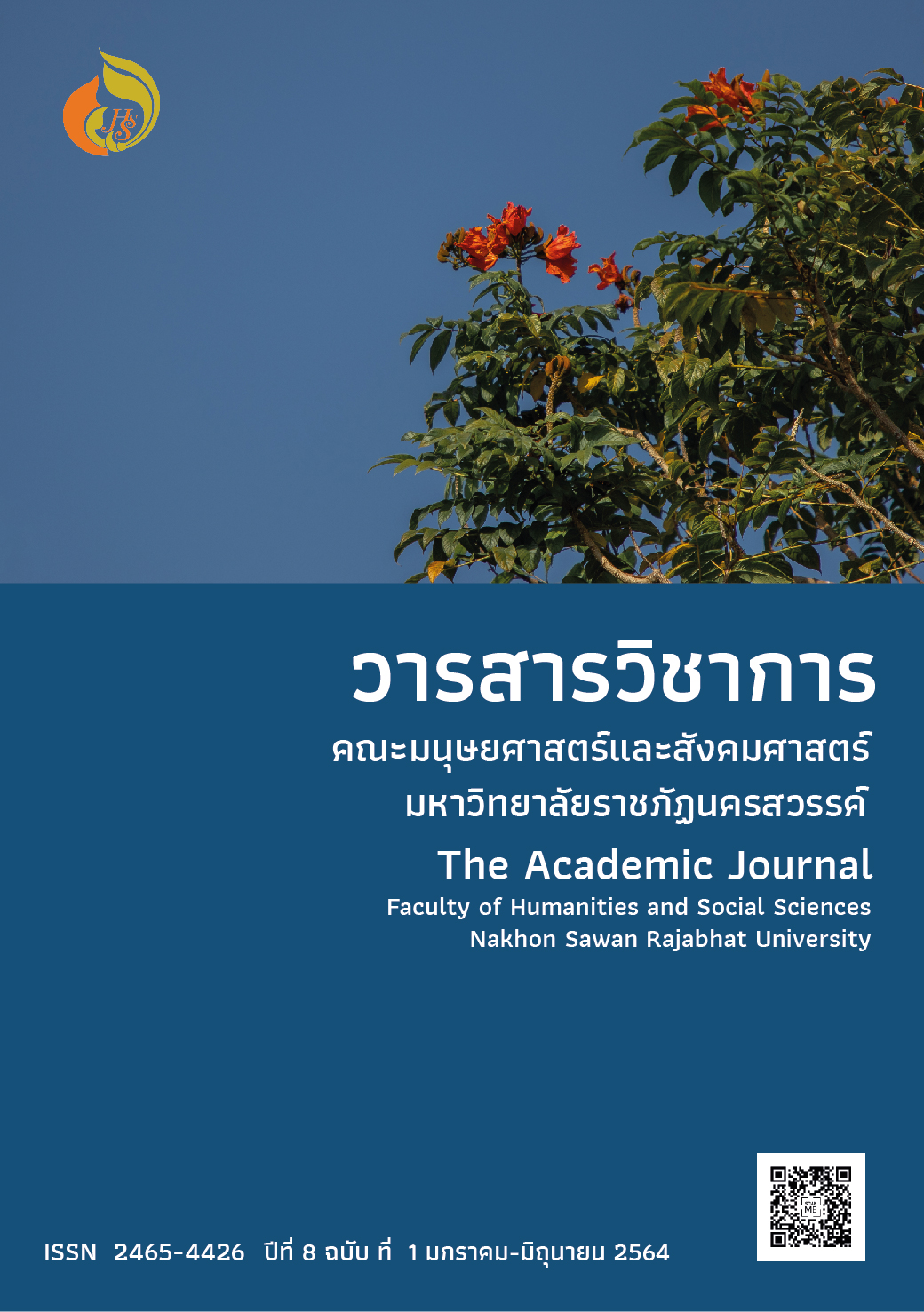The Development of E-Learning Lessons for Accounting II Course
Main Article Content
Abstract
The purposes of this research were to create E-learning lessons for Accounting ll course, to compare the achievement of the course through E-learning lessons based on 70/70 standard criteria, and to study the learners’ satisfaction on the implementation of E-Learning lessons. The data were collected from 29 first-year students of Accounting Program, Faculty of Management Sciences, Kamphaeng Phet Rajabhat University, Mae Sot Campus, including 22 regular program students and seven transfer students. The purposive sampling was used. This research was conducted in semester 2/2017. The instruments of this research were an achievement test and the questionnaire of the students’satisfaction toward E–learning lessons. The results found that the efficiency of the quality of the E-learning lessons was 35.47/71.13, which corresponded to the hypothesis of the study. Moreover, the efficiency of the pre-test scores in all eight units of study was 35.47 and the efficiency of post-test scores of all eight units of study was 71.13. The comparison of the academic achievement of the participants showed that their post-test scores were significantly higher than the pre-test at the level of .05. According to the survey, it was revealed that the participants were satisfied with the E-learning lessons at a high level (x̄ 4.29)
Article Details

This work is licensed under a Creative Commons Attribution-NonCommercial-NoDerivatives 4.0 International License.
References
กระทรวงศึกษาธิการ. (2542). พระราชบัญญัติการศึกษาแห่งชาติ พ.ศ. 2542 และที่แก้ไขเพิ่มเติม (ฉบับที่ 2) พ.ศ. 2545. กรุงเทพฯ: โรงพิมพ์คุรุสภาลาดพร้าว.
กระทรวงศึกษาธิการ. (2551). ICT กับ E-LEARNING. กรุงเทพฯ: โรงพิมพ์คุรุสภาลาดพร้าว.
กิดานันท์ มลิทอง. (2540). เทคโนโลยีการศึกษาและนวัตกรรม. กรุงเทพฯ: โรงพิมพ์ชวนพิมพ์.
คณะกรรมการการศึกษาแห่งชาติ. 2545. พระราชบัญญัติการศึกษาแห่งชาติ พ.ศ. 2542 (ฉบับปรับปรุง 2545). กรุงเทพฯ: สำนักงานคณะกรรมการการศึกษาแห่งชาติ, สำนักนายกรัฐมนตรี.
พัชรภรณ์ วรโชติกำจร, และฐะณุพงศ์ ศรีกำฬสินธุ์. (2558). การพัฒนาบทเรียนคอมพิวเตอร์บนระบบเครือข่ายอินเทอร์เน็ต: ระบบการจัดการฐานข้อมูล. วารสารวิชาการนวัตกรรมสื่อสารสังคม, 3(1), 51–66.
ไพรินทร์ มีศรี, และอวยพร มีศรี. (2558). การพัฒนาสื่อการสอนอิเล็กทรอนิกส์ วิชาการเขียนโปรแกรมภาษาคอมพิวเตอร์ เรื่อง การวนซ้ำ สำหรับนักศึกษามหาวิทยาลัยราชภัฏวไลยอลงกรณ์ ในพระบรมราชูปถัมภ์. วารสารวิจัยและพัฒนาวไลยอลงกรณ์ในพระบรมราชูปถัมภ์, 10(1), 49–56.
วันเฉลิม พูนใจสม และคณะ. (2560). การพัฒนาบทเรียนออนไลน์ เรื่อง ไอพีวี6 สำหรับนักศึกษาสาขาวิทยาการคอมพิวเตอร์มหาวิทยาลัยราชภัฏกำแพงเพชร. วารสารวิชาการการจัดการเทคโนโลยีสารสนเทศและนวัตกรรม, 5(2), 40-50.
วิชิต แสงสว่าง. (2560). ผลการใช้บทเรียน E–LEARNING เรื่อง สัมมนาทางคอมพิวเตอร์ศึกษาสำหรับนักศึกษาสาขาวิชาคอมพิวเตอร์ศึกษา. วารสารศึกษาศาสตร์ มหาวิทยาลัยนเรศวร, 19(1), 131-145.
สามมิติ สุขบรรจง. (2554). การพัฒนาบทเรียน E-LEARNING รายวิชาการแสดงและสื่อ (วิทยานิพนธ์ปริญญาดุษฏีบัณฑิต). กรุงเทพฯ: มหาวิทยาลัยศรีนครินทรวิโรฒ.
อนุชา สะเล็ม. (2560). การประยุกต์ใช้E-LEARNING ในกระบวนการเรียนการสอนวิทยาลัยเทคโนโลยีบริหารธุรกิจมีนบุรีกรุงเทพ. หลักสูตรวิทยาศาสตรมหาบัณฑิต สาขาวิชาเทคโนโลยีสารสนเทศ คณะวิทยาการและเทคโนโลยีสารสนเทศ. มหาวิทยาลัยเทคโนโลยีมหานคร.


